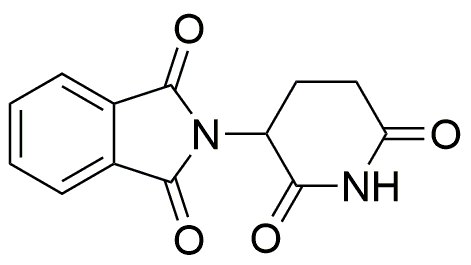(±)-Thalidomide is widely utilized in research focused on
- Multiple Myeloma Treatment: This compound is approved for treating multiple myeloma, a type of blood cancer. Its ability to inhibit tumor growth and modulate the immune system makes it a valuable option for patients.
- Leprosy Management: Thalidomide is effective in treating complications of leprosy, particularly erythema nodosum leprosum, providing relief from painful skin lesions and inflammation.
- Anti-Inflammatory Applications: Due to its immunomodulatory properties, it is used in treating various inflammatory conditions, including Crohn's disease and ulcerative colitis, offering an alternative for patients who do not respond to conventional therapies.
- Research in Angiogenesis: Thalidomide is studied for its role in inhibiting angiogenesis, the formation of new blood vessels, which is crucial in cancer progression and other diseases, making it a key focus in cancer research.
- Potential in Autoimmune Disorders: Ongoing research is exploring its use in autoimmune diseases like lupus and rheumatoid arthritis, where it may help modulate the immune response and reduce symptoms.
General Information
Properties
Safety and Regulations
Applications
(±)-Thalidomide is widely utilized in research focused on
- Multiple Myeloma Treatment: This compound is approved for treating multiple myeloma, a type of blood cancer. Its ability to inhibit tumor growth and modulate the immune system makes it a valuable option for patients.
- Leprosy Management: Thalidomide is effective in treating complications of leprosy, particularly erythema nodosum leprosum, providing relief from painful skin lesions and inflammation.
- Anti-Inflammatory Applications: Due to its immunomodulatory properties, it is used in treating various inflammatory conditions, including Crohn's disease and ulcerative colitis, offering an alternative for patients who do not respond to conventional therapies.
- Research in Angiogenesis: Thalidomide is studied for its role in inhibiting angiogenesis, the formation of new blood vessels, which is crucial in cancer progression and other diseases, making it a key focus in cancer research.
- Potential in Autoimmune Disorders: Ongoing research is exploring its use in autoimmune diseases like lupus and rheumatoid arthritis, where it may help modulate the immune response and reduce symptoms.
Documents
Safety Data Sheets (SDS)
The SDS provides comprehensive safety information on handling, storage, and disposal of the product.
Product Specification (PS)
The PS provides a comprehensive breakdown of the product’s properties, including chemical composition, physical state, purity, and storage requirements. It also details acceptable quality ranges and the product's intended applications.
Certificates of Analysis (COA)
Search for Certificates of Analysis (COA) by entering the products Lot Number. Lot and Batch Numbers can be found on a product’s label following the words ‘Lot’ or ‘Batch’.
Numéro de catalogue
Numéro de lot/série
Certificates Of Origin (COO)
This COO confirms the country where the product was manufactured, and also details the materials and components used in it and whether it is derived from natural, synthetic, or other specific sources. This certificate may be required for customs, trade, and regulatory compliance.
Numéro de catalogue
Numéro de lot/série
Safety Data Sheets (SDS)
The SDS provides comprehensive safety information on handling, storage, and disposal of the product.
DownloadProduct Specification (PS)
The PS provides a comprehensive breakdown of the product’s properties, including chemical composition, physical state, purity, and storage requirements. It also details acceptable quality ranges and the product's intended applications.
DownloadCertificates of Analysis (COA)
Search for Certificates of Analysis (COA) by entering the products Lot Number. Lot and Batch Numbers can be found on a product’s label following the words ‘Lot’ or ‘Batch’.
Numéro de catalogue
Numéro de lot/série
Certificates Of Origin (COO)
This COO confirms the country where the product was manufactured, and also details the materials and components used in it and whether it is derived from natural, synthetic, or other specific sources. This certificate may be required for customs, trade, and regulatory compliance.


